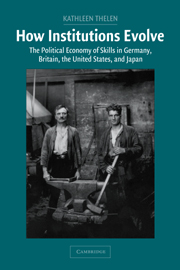 How Institutions Evolve
How Institutions Evolve Published online by Cambridge University Press: 05 September 2012
In the case of Germany, we saw that state policy in the early industrial period was crucial to establishing the trajectory that skill formation there would take. Legislation targeted at the artisanal sector contributed to the survival of a relatively stable system of apprenticeship, and at the same time discouraged unions from pursuing skill-based strategies for labor market control. Firms in industries that depended heavily on skills drew on the artisanal sector as a source of skilled labor but they also competed with Handwerk as a corporate actor, especially over skill certification. This produced a dynamic through which industry was pushed and pulled toward training practices that built on, and in some ways paralleled, those developed in the artisanal sector.
In Britain, state policy worked in the opposite direction, contributing to the deregulation of traditional apprenticeship and indirectly encouraging the development of skill-based unions pursuing strategies premised on craft control. The legal framework in place in the nineteenth century discouraged the formation of unions among unskilled laborers while encouraging skilled workers to organize around the provision of friendly society benefits. Responding to this set of incentives and constraints, early trade unions organized their strategies around the attempt to influence wages and employment by manipulating the supply of skilled labor. This set up a completely different set of dynamics in Britain in which apprenticeship was contested not – as in Germany – between an independent artisanal sector and an emerging industrial sector, but rather between craft unions and employers in skill-dependent industries.
To save this book to your Kindle, first ensure [email protected] is added to your Approved Personal Document E-mail List under your Personal Document Settings on the Manage Your Content and Devices page of your Amazon account. Then enter the ‘name’ part of your Kindle email address below. Find out more about saving to your Kindle.
Note you can select to save to either the @free.kindle.com or @kindle.com variations. ‘@free.kindle.com’ emails are free but can only be saved to your device when it is connected to wi-fi. ‘@kindle.com’ emails can be delivered even when you are not connected to wi-fi, but note that service fees apply.
Find out more about the Kindle Personal Document Service.
To save content items to your account, please confirm that you agree to abide by our usage policies. If this is the first time you use this feature, you will be asked to authorise Cambridge Core to connect with your account. Find out more about saving content to Dropbox.
To save content items to your account, please confirm that you agree to abide by our usage policies. If this is the first time you use this feature, you will be asked to authorise Cambridge Core to connect with your account. Find out more about saving content to Google Drive.